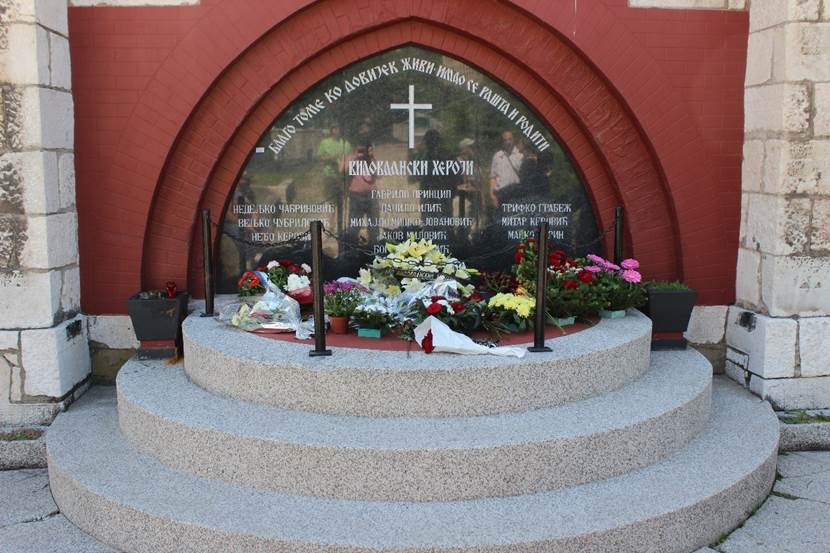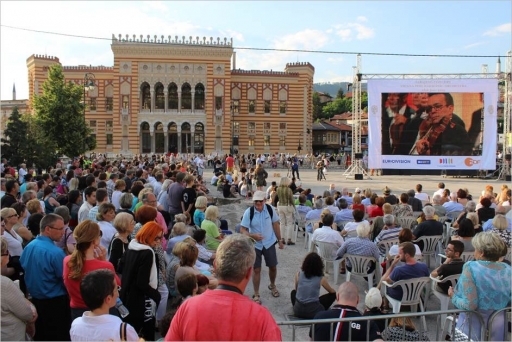The assassination of the Archduke on June 28th 1914 was remembered today in Sarajevo. Nigel Dacre has sent this report for Centenary News.
The Centenary of the Archduke’s assassination was marked today in the Bosnian capital Sarajevo by cultural, academic and remembrance events.
At 6.15pm local time, the Vienna Philharmonic Orchestra performed a concert in the City Hall. It is the building where Franz Ferdinand and his wife Sophie attended a reception just before they were shot, and it has recently been renovated and reopened after being badly damaged by shelling in 1992 during the Siege of Sarajevo.
The concert, the centrepiece for the city’s anniversary commemorations, was transmitted by Eurovision to TV and radio broadcasters around the world.
A large screen on the other side of the river from the City Hall also showed the event.
Before the concert began, the Austrian music director Franz Welser-Most said the orchestra had come to Sarajevo “with a historical burden” and “to send a clear message: never again!”
The concert concluded with the European anthem, Beethoven’s ‘Ode to Joy’.
It was attended by the Austrian President Heinz Fischer, but boycotted by Serbian and Bosnian Serb leaders.
 The large screen showing the Vienna Philharmonic concert
The large screen showing the Vienna Philharmonic concert
Other Anniversary Events
Earlier in the day, tourists and journalists gathered at the spot near the Latin Bridge where the assassination had taken place. A replica of the car that the Archduke had been travelling in was parked next to where the shooting had happened.
At the University of Sarajevo, an interdisciplinary conference debated the shooting and its aftermath. It included a presentation by the American historian Robert Donia about the starkly contrasting ways that different governments and organisations have portrayed the assassin Gavrilo Princip during the past 100 years.
And at the Chapel in a Sarajevo cemetery where Princip and most of his fellow conspirators are buried, flowers and wreaths were laid by pro-Serbian organisations. The wreaths had messages honouring the young assassins. One message expressed “eternal gratefulness”.
 Flowers and wreaths left today at the Sarajevo chapel where the assassins are buried
Flowers and wreaths left today at the Sarajevo chapel where the assassins are buried
How Sarajevo Remebered the Assassination – A Personal Viewpoint
Sarajevo marked the centenary of the assassination in a mainly low key way.
The city is not adorned with assassination anniversary posters. And the crowds at the site of the assassination in the morning, and at the public showing of the City Hall concert in the early evening, were not large.
This is partly because the main European Centenary events during 1914 are being held in France and Belgium.
But I get the sense that it also reflects the fact that the city is uncomfortable with the anniversary.
After all, the shooting in Sarajevo did lead to the First World War, and the death of millions of people.
It also comes less than 20 years after the end of the Bosnian War. Even around the Latin Bridge, near to where the assassination occurred, you can see the hills from where the Serbian artillery and snipers attacked the city. It was made clear to me by a number of local people that war is not a topic that many in Sarajevo want to spend time remembering.
And local communities, of course, are still bitterly divided over how to remember Princip. Should he be seen as a nationalist terrorist who started a global war, or as a Serbian hero who ended the Austro-Hungarian occupation of the Balkans?
Sarajevo, an historic, troubled city, certainly marked the anniversary of the shooting of the Archduke Franz Ferdinand today, but it didn’t revel in it.
Read here a report on how Sarajevo marked the anniversary of the actual time that the assassination took place.
Nigel was in Sarajevo on a tour organised by Military History Tours www.militaryhistorytours.co.uk. The Surrey-based company is run by Gavin Worrall.
Images courtesy of Nigel Dacre, Centenary News
